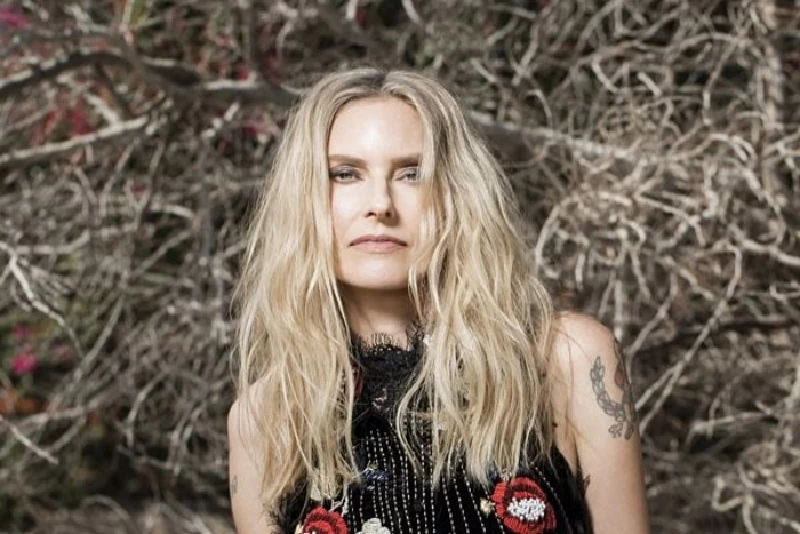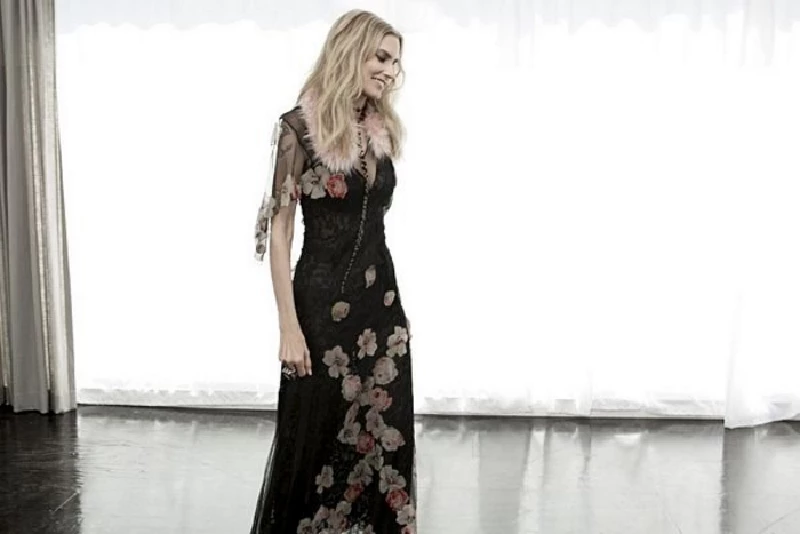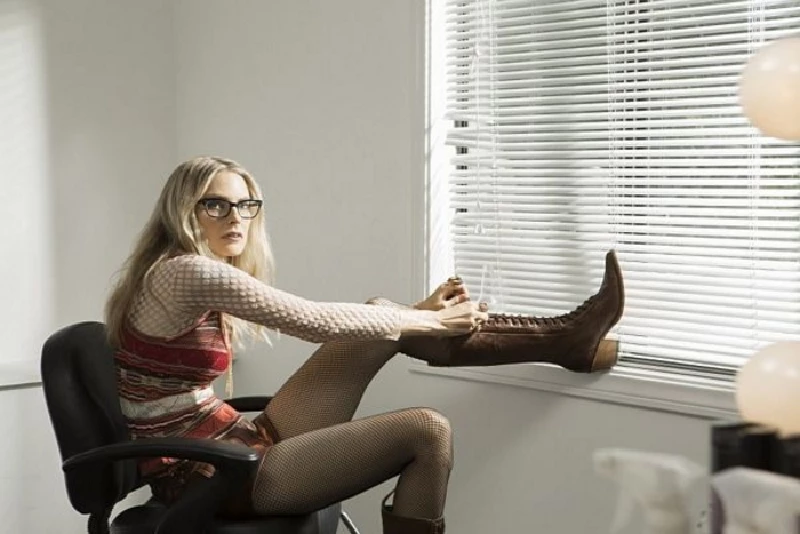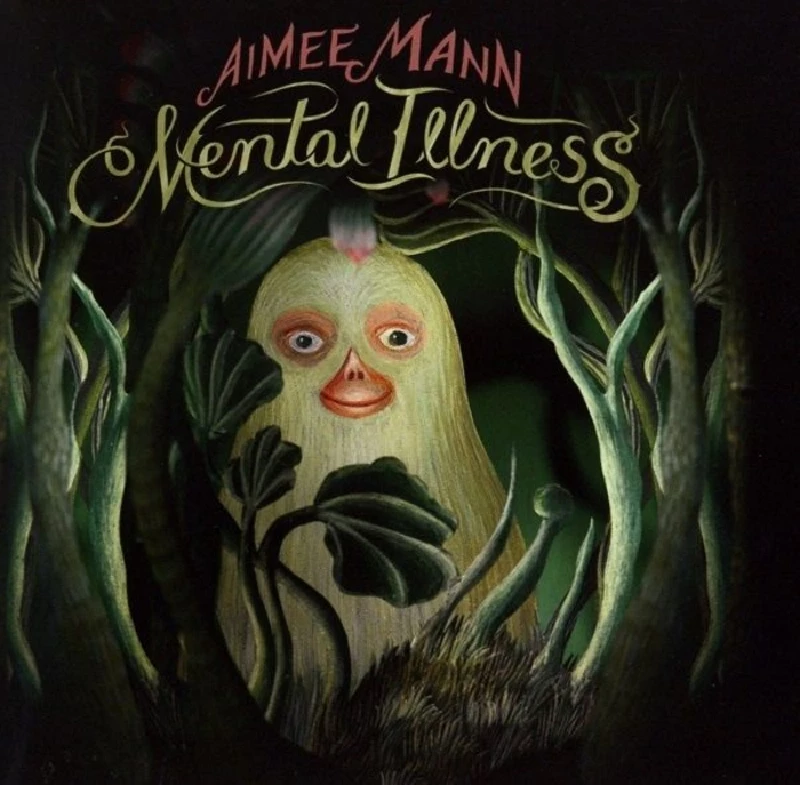“There is a sort of a coma that descends on me after talking about myself for too long. I guess some people never get tired of talking about themselves and maybe it’s energising, but for me there’s a definite limit!” In the lead-up to the release of her ninth solo album, Aimee Mann has had to do a lot of interviews. If she is nearing her limit though, you wouldn’t know it. When she speaks to me over the phone from LA, she’s engaging, enthusiastic, thoughtful and funny. We chat breezily for a solid half hour, and if I could, I would have happily kept chatting for a lot longer. From her early career with new wave band ‘Til Tuesday, through her solo career and collaborations with Ted Leo and the filmmaker Paul Thomas Anderson, Aimee Mann has been a mainstay of the alternative music scene for well-over thirty years, producing often melancholic, sometimes dark folk and pop songs that somehow sit comfortably alongside her upbeat, personable manner and often very funny videos. She has many friends in the LA comedy scene and will often appear with them in live performances and TV shows. She also played a German nihilist in the Coen brothers’ film 'The Big Lebowski', involved in a kidnapping plot that saw her character surrender a small toe. Her new record, 'Mental Illness', might be her saddest record to date, but the stripped-back, acoustic songs give it an intimate quality that, when paired with Mann’s reliably imaginative lyrics, make it a pleasure to listen through. PB: I’ve had the new album for about a week now and have been listening to it in my car. I’m really enjoying it. AM: Thank you so much. PB: That’s my favourite way to get to know an album, is to have it in the car. AM: Yeah and drive around with it. PB: So it’s called 'Mental Illness', which is quite an eye-catching name. Where did that come from? AM: It was actually suggested by a friend of mine as a joke, because he knew I was working on a new record and he said, “What are the songs about?” I was kind of flippant and said, “Ah you know, my usual songs about mental illness,” and he was like, “Oh, well you should call it 'Mental Illness' then.” And because it’s so arresting and so bold, there was something appealing about it so it kind of stuck with me. PB: The artwork is very cool as well. I love it. It’s also very striking. AM: Yeah, I love the artwork. I think that artist [Andrea Deszö] is really great. I have an art director I’ve worked with for years and, you know, working on the package - even though obviously people don’t really buy CDs anymore, but it’s nice that vinyl has made a little bit or a resurgence, so it’s good to have something to make a package for because I really do love the process of coming up with nice artwork. PB: Another one of my favourites is the cover art for '@#%&*! Smilers'. The image on that one is great as well; it works so well with and against the title. AM: That artist, Gary Taxali, is really fantastic. I have a bunch of his artwork too, actually. PB: I love a good album package. As you say, physical albums are kind of on their way out, despite vinyl kind of making a comeback, but personally I really like having something to flip through while I’m listening. AM: Yeah, me too. Me too. And vinyl is nice because it’s big enough that you can really see what’s going on. PB: And also it’s the process of listening to it; like you have to get up and flip it over and engage with it. It’s more active listening than just having a song on your iPhone, soundtracking whatever else you’re doing. AM: Yeah, exactly. PB: But to get back to 'Mental Illness', I feel like it’s a bit less poppy than your previous album, 'Charmer'. It feels more stripped back, acoustic and intimate. Was that a conscious decision? AM: Yeah, that was definitely the idea. Writing this kind of stuff and recording it like this. This is really, I think, the most ‘me’, because I guess on some level I come from a fairly folky, 70's singer-songwriter background and I really like that played-on-acoustic-guitar kind of thing. A bit of strings here and there, some percussion. I like to keep it really simple. I like the challenge of having it be interesting even though it is really simple. To use the instrumentation as sparsely as possible. I just feel like you can hear everything, even if what you’re hearing is an acoustic guitar. If that’s the only instrument you’re hearing, you can hear the fingers on the strings and a little bit of string noise and the resonance of the wood and everything. There’s something that’s just very exciting to me about that, rather than, you know, when there’s a lot of tracks they all sort of blend together and in a way it gets smaller and smaller. PB: Were these songs all written together? Did you sit down and think, “Okay, time to write a new album,” or was it a more a piecing together of songs you’d written over time? AM: Most of them I did write around the same time. You know I had a couple of things that were germinating or had been – 'Philly Sinks' is a song that I had written for the last record, but it really didn’t go. So that was kind of the jumping-off point, although I rewrote some of it. I changed it a bit. But yeah, I sat down every day and just wrote a little bit every day. The way I approach it is, I set a timer for fifteen minutes, because I think it gets daunting if you think, “I have to write a record.” So, I made the task just to sit for fifteen minutes and noodle around on guitar or listen to work tapes or make lists of things, or whatever. Just for fifteen minutes and that was it. If that mushroomed into working on a song and I wanted to keep going, of course I would, but I think that for me, that’s how small the task has to be for it to not feel overwhelming. PB: That’s really interesting. It’s a very formalised way of writing music. But I guess in terms of making yourself sit down and do it, which must be the hardest part if you’re having to start again and write new songs, I guess it’s like looking at a blank sheet of paper. AM: Yeah, that’s what it is and even the idea of thinking “It’s probably time to start making a new record” can start to seem like pressure, so it’s just a way to avoid that. You know, in this day and age, it’s very easy to distract yourself without even trying. You check Twitter to see what’s going on and then an hour later you’re like, “My life! What happened?” So I did have to kind of set a little bit of a goal just to make sure that I ended up with a guitar in my hand at some point during the day. It’s just really easy to have the day get away from you, or get involved in other things – cleaning up the basement or some other task. As if my basement is so clean. Really it’s more like thinking about how I need to clean up the basement. That’s my task that I absorb myself with instead of working. PB: Yeah, well looking at the state of my desk that’s in front of me now, I can really relate to that kind of thinking. It’s a desk that’s needed cleaning for about three years, but I’ve thought about cleaning it a lot. AM: Yeah, exactly, and then you think, “Well, I can’t sit and write a story if this desk is calling to me. How could I even think about doing something that might be fun or move my career forward or whatever the big goal is? – Look at this desk!” But you’re not cleaning up the desk, you’re just thinking about how it’s more important. PB: I’ll probably start making a mental list of things I need to tidy before I can get on with anything else. Then once that list’s done it’s time to relax. AM: Yes, that’s right. Perfect. PB: Well talking of getting lost on the internet, I was looking through a whole bunch of your music videos on YouTube this afternoon. You’ve had a couple of new ones out for this album – 'Goose Snow Cone' and 'Patient Zero' – and I always think that your videos are so funny and creative. They’re a lot of fun to watch. Do you enjoy the process of coming up with those ideas? AM: No, I don’t. Because so much of it is out of my hands. It’s one thing to talk about something and picture it in your head, and you don’t really know how the director is picturing it. And also I don’t have much money, so you know, you’re trying to do something – of course I’m picturing this great piece of cinema in my head, you know… [Laughs] on $7000. So, it’s hard and kind of nerve-wracking and it’s hard to know how it’s going to come out. But actually both of those videos did come out pretty close to what we had talked about, what I envisioned. But a lot of times it’s about choosing a director that you trust and… but that’s hard, because it’s hard to find people in the sweet-spot of, “Yes, making a video for practically free would be fun” and “I know what I’m doing.” That’s a very narrow demographic [Laughs]. PB: Well, it seems to have worked out for you so far, because all your videos are very entertaining. AM: So far, yeah. I had a couple of really good, funny videos for my last record. This director, Tom Scharpling is a very funny comedy writer and I thought his videos were really great [Scharpling directed music videos for Aimee’s album 'Charmer', including a video for her song ‘Labrador’, which was a shot-for-shot remake of the 1985 video for ‘Voices Carry’ by ‘Til Tuesday] . And that was a case of really trusting somebody else having an idea and trusting that that idea would come off really well. PB: Also for 'Charmer', you made a video with Tim Heidecker [comedian/songwriter Heidecker is mostly known for his comedy partnership with Eric Wareheim, and for their shows 'Tom Goes to the Mayor' and #Tim and Eric, Awesome Show, Great Job!']. AM: Yeah, and Tim directed that. It was called ‘Soon Enough’. Yeah, and I wrote that song with Tim. PB: Weirdly enough, a few years ago I went to a screening in London of the film he made with Eric Wareheim, and I met Tim’s wife [actress Marilyn Porayko] while I was waiting at the bar in the cinema. While I was talking to her, she said that they’d just finished filming this new video for one of your songs. AM: Yeah, we’re very close friends with them, she’s fantastic. That was a nice little video. Tim really has a great musical sense, you know? He writes a lot songs. He writes very fast. He has an idea - it’s usually a parody song, usually an anti-Trump song – he writes fast, he records it and it comes out later that afternoon, which is something I can’t manage, but I think he’s got a real good melodic sense and he could have been a musician if he wanted – Well he is a musician, but you know what I mean. PB: I do. But you also wrote an anti-Trump song last year; ‘Can’t You Tell’. I really liked it – I have to sa., the lyrics were really good, and they obviously perfectly captured his mindset, but the chorus almost made me feel sorry for him. AM: [Laughs] That was not my intention! I think the problem is, once I start writing a song and I try to connect to the person or the character I’m writing about, you know, once I connect to it I find pathos in it, because I just think everybody’s so pathetic. Everybody has this pathetic, sad side that’s just so – I mean, he’s so fucking hopeless! Not to say that we should give him any more chances, but my God, I don’t know what’s wrong with him. I have some theories. I think several things are wrong with him. I think he’s got some kind of dementia happening, as well as a sort of delusion narcissism. PB: Yeah, there were some pictures of sitting him in the cab of a parked truck this week, pretending to drive it and you have to wonder, “How do you think this looks?” Have you had to answer a lot of questions about Trump promoting this album? I feel like every interview I read by a British person talking to an American at the moment has to cover Trump at some point, so I don’t want to get too stuck on him. AM: Well, you know, with everybody I know it’s almost hard to talk about anything else because it feels like such an emergency. It’s such a crazy situation, where your President is being investigated for possibly colluding with a foreign country. But the election, that’s super crazy and it’s hard to feel like you’re in the hands of a crazy person. And also I think women feel like, “Oh yeah, great. My molester is now President of the United States. Boy, I feel safe.” PB: To be honest, nothing makes sense to me anymore. Obviously we had Brexit last year, which was pretty baffling to me, and then with Trump’s election this year, and then also just the fact that so much seems to have lost any meaning – within the press, within politics – nothing feels like it really means anything, or has much that’s truthful about it, and I think one of the things I’ve actually really enjoyed about listening to your album this week is that it felt like it was actually saying something; the songs felt like they meant something, to you as the writer, and that they were saying something meaningful to me. AM: Well, thank you. I know what you mean though. It is a crazy time. I think the digital age means that propaganda is very easily disseminated and people are susceptible to propaganda – that’s not a new thing. How do you fight the proliferation of that kind of propaganda? I don’t know, but I think both our election and Brexit were really informed by a huge influx of propaganda and making note of that as a factor – it’s not that everyone’s crazy, it’s that people have been influenced by faulty arguments that sounded good at the time. You know, to a certain type of mind that would say “Trump and Clinton are just the same!" That’s kind of an appealing argument if you like to feel that you’re really being a rebel against 'The System', whatever 'The System' is. So, I think that appealed to a lot of people and that got a lot of Democrats to just not show up at the polls. But if you look at that argument, that’s an argument that only works in the abstract, and then you have reality and you’re like, “Oh my God! Of course, they’re totally different! What was I thinking? It’s crazy! This is a disaster!” It’s hard for people to think things through. PB: Yes, there’s definitely a level of “stickin’ it to The Man!” and then waking up to everything on fire. AM: Yeah, “Oh my God, I’m The Man myself!” PB: But let’s move on to something less depressing… AM: Yeah, we can talk about music! PB: Actually, having mentioned Tim Heidecker, I wanted to talk about your relationship with the LA comedy scene, as I know you have a lot of friends who are comedians. I’ve heard you on Scott Aukerman’s 'Comedy Bang Bang!' podcast a few times, and I know you’re friends with Paul F. Tompkins and other comics. Is there a strong link between the music and comedy scenes in the States? AM: I think so. I started to get interested in comedy because the club in LA called Largo, a long time ago started having comedy nights every Monday night and me and my husband, Michael Penn, played at Largo a lot and we would start going to the comedy nights and seeing alternative comedy, as it was known then – all comedy is alternative at this point. That’s when we saw people like Andy Kindler and Paul F. Tompkins, Marc Maron and all those people. That was sort of pre-Tim Heidecker, but David Cross and Bo Odenkirk, and we met Tim through Bob Odenkirk. Patton Oswalt, he’s a good friend of ours. I really like comedians. There’s a use of language and an awareness that choosing the perfect word makes a difference. I really like people who are very language-centric in that way. PB: I imagine you have to talk about this all the time, so I apologise in advance for bringing it up, but as a huge movie-nerd I feel like I would be doing a disservice to myself if I didn’t ask you about 'Magnolia'. Is Largo also where you met ['Magnolia' writer/director] Paul Thomas Anderson? AM: I think Paul contacted Michael first to score his movie Hard Eight and they became friends, and then that’s how I got to know Paul. Then I think we introduced him to the Largo scene, where he met Jon Brion and started working with Jon. PB: The question I had specifically about that film was to do with the famous scene where the whole cast sing along to your song ‘Wise Up’. Was that song already written or did you write it specifically for that scene? Were you surprised that it was used in that way? AM: That song was already written and I think Paul had heard it and felt that it was a shame that it hadn’t had more use gotten out of it or had more attention. And I was very surprised at that scene, because I’d never seen something like that. When he first was telling me about what he was going to do, I was like, “er, this is not going to work at all.” I could not picture that at all, but that just illustrates the difference between somebody who thinks visually versus somebody who works almost entirely just in words and music. PB: And it does work so well; I think it’s almost an iconic movie scene at this point, partly because it is so unusual. AM: Yeah, it’s amazing. Nobody’s really done that. But the whole tone of the movie was that reality had a surreal feel and the surreal had a flavour of matter-of-fact reality. So it was interesting. It had a kind of dream-state without being magic realism. PB: I wanted to wrap things up by asking about influences, particularly formative ones. For example, when you were a kid, what kind of music was playing around your house? AM: I think the first music that I heard that I was kind of like, “Ooh, what’s that?” was Peter, Paul and Mary, so that’s like real folk stuff. I thought that had a nice sound, and then my step-mother used to play Glen Campbell, which I loved because it’s all those Jimmy Webb songs. So I feel like, honestly [Laughs] really I’ve summed up this record there: Jimmy Webb’s songwriting meets Peter, Paul and Mary. PB: And what was the first album you ever bought? AM:' Mad Man Across the Water', Elton John. I bought it just because I was a kid and I was like, “Oh I like this record cover!” I had no idea who he was. And then I took it home and I was like “Whaaaat?” Because that record does have kind of an unusual… I don’t know, it had a real melancholy, kind of spooky sound almost, that wasn’t like other stuff that was out there. And I really liked it. And then later on I heard ‘Tiny Dancer’ on the radio, but it’s such an interesting experience discovering something that you have no idea who this person is and thinking “What… what is this about?” It was really fun. PB: Well to take us back full circle, that’s one of the real shames about the way people buy music these days, is people don’t shop for music in that way. You don’t get people flicking through racks of albums and picking out the freakiest cover to buy. AM: Exactly. I remember getting the first Liz Phair record ['Exile In Guyville'] and I hadn’t heard anything about her. So it was really interesting. It’s another really iconic record and it was really interesting hearing this record and having no idea - not having pictures or anything, or any idea what the context was. Just kind of being blown away by it by virtue of its own idiosyncratic… she really broke a lot of ground. I know. It’s almost like you know too much about people before you listen to something. PB: In every aspect of life; I feel like I know too much about everybody these days. AM: [Laughs] I know. There’s no mystery. PB: Thank you.
Band Links:-
http://aimeemann.com/https://www.facebook.com/AimeeMann
https://twitter.com/aimeemann
https://en.wikipedia.org/wiki/Aimee_Mann
Picture Gallery:-






intro
Jamie Rowland talks to singer-songwriter Aimee Mann about her ninth solo album 'Mental Illness', her songwriting and the influence of film and comedy on her music
most viewed articles
current edition
Carl Ewens - David Bowie 1964 to 1982 On Track: Every Album, Every SongArmory Show - Interview with Richard Jobson
Colin Blunstone - Thalia Hall, Chicago, 16/7/2025
Bathers - Photoscapes 1
Visor Fest - Valencia, Spain, 26/9/2025...27/9/2025
John McKay - Interview
Billie Eilish - O2 Arena, London, 10/7/2025
Robert Forster - Interview
Sir Tim Rice - Interview
Loft - Interview
previous editions
Heavenly - P.U.N.K. Girl EPManic Street Preachers - (Gig of a Lifetime) Millennium Stadium, Cardiff, December 1999
Beautiful South - Ten Songs That Made Me Love...
Pixies - Ten Songs That Made Me Love...
Oasis - Oasis, Earl's Court, London, 1995
Prolapse - Interview
Trudie Myerscough-Harris - Interview
Paul Clerehugh - Interview
Doris Brendel - Interview
Simon Heavisides - Destiny Stopped Screaming: The Life and Times of Adrian Borland
most viewed reviews
current edition
Sick Man of Europe - The Sick Man of EuropeLucy Spraggan - Other Sides of the Moon
Amy Macdonald - Is This What You've Been Waiting For?
Phew, Erika Kobayashi,, Dieter Moebius - Radium Girls
Davey Woodward - Mumbo in the Jumbo
Bush - I Beat Loneliness
Alice Cooper - The Revenge of Alice Cooper
Blueboy - 2
Cynthia Erivo - I Forgive You
Suzanne Vega - Flying With Angels
Pennyblackmusic Regular Contributors
Adrian Janes
Amanda J. Window
Andrew Twambley
Anthony Dhanendran
Benjamin Howarth
Cila Warncke
Daniel Cressey
Darren Aston
Dastardly
Dave Goodwin
Denzil Watson
Dominic B. Simpson
Eoghan Lyng
Fiona Hutchings
Harry Sherriff
Helen Tipping
Jamie Rowland
John Clarkson
Julie Cruickshank
Kimberly Bright
Lisa Torem
Maarten Schiethart